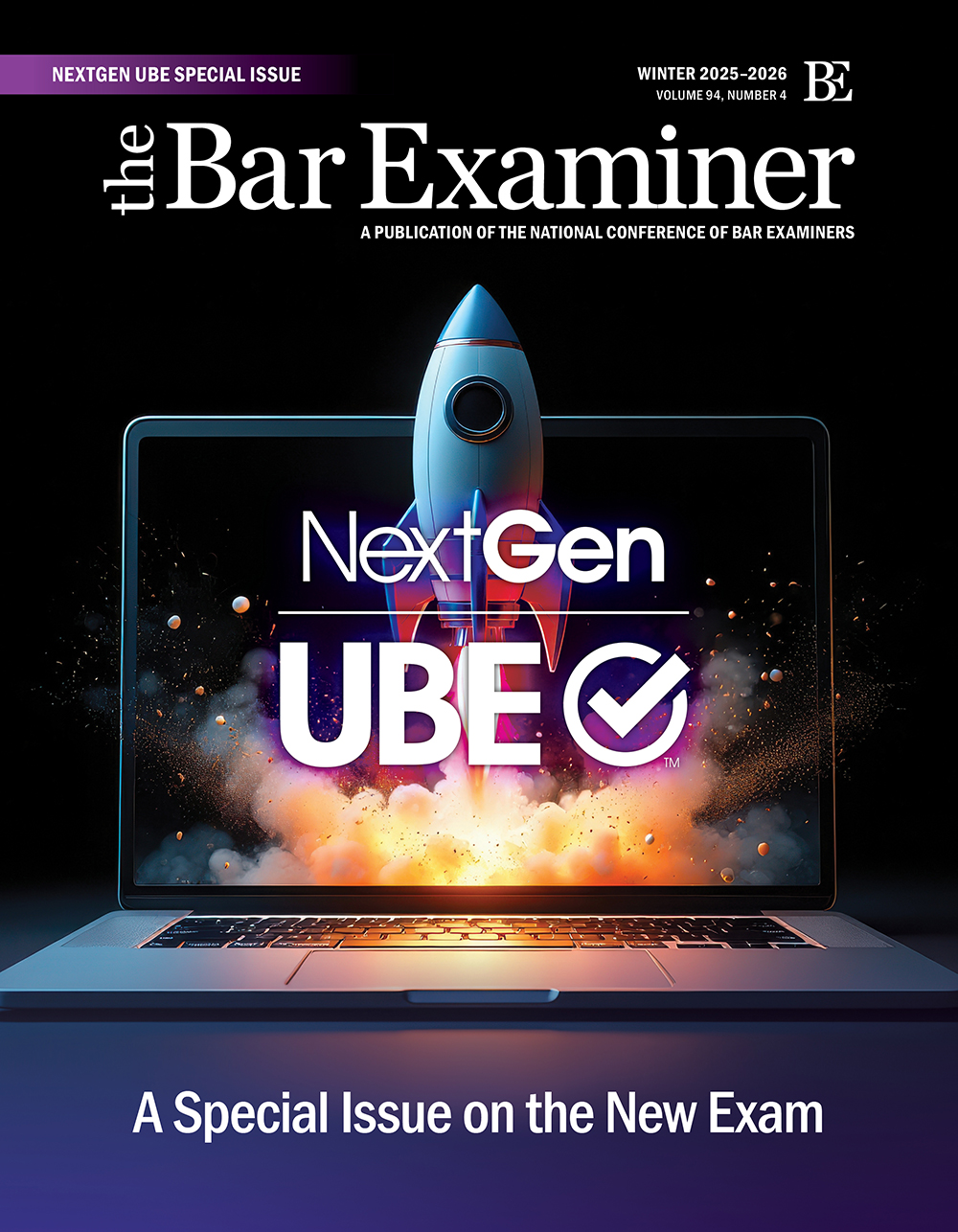This article originally appeared in The Bar Examiner print edition, Spring 2023 (Vol. 92, No. 1), pp. 46–48.By Suzanne K. Richards; Hon. Phyllis D. Thompson; Danette Waller McKinley, PhD; and Penelope J. Gessler
A series of articles on topics of immediate significance to the bar admissions community.
DIVERSITY SERIES: Diversity in the legal profession and efforts to enhance the participation and success of underrepresented and/or historically disadvantaged groups in legal education and bar admissions.
For most applicants, admission to the bar requires passing an examination and undergoing the character and fitness investigation process. For the latter, jurisdictions make admissions decisions based, in part, on information provided by applicants on a character and fitness application. Almost 25 jurisdictions currently require all or a portion of their applicants to complete the NCBE Character and Fitness Application (the “NCBE Form” or the “Form”) to assist NCBE or the jurisdictions themselves in conducting applicant background investigations and character and fitness reviews. Additional jurisdictions use the NCBE Form as a model, tailoring it for their own jurisdiction-specific needs, and still others consult the NCBE Form in developing their own forms.
History of the NCBE Character and Fitness Application
The NCBE Form has evolved since NCBE began to support jurisdictions by processing application materials. Prior to the launch of the NCBE Form in 1997, each jurisdiction had its own unique character and fitness application form. Since the launch of the Form—which began as two separate applications for law students and soon-to-be attorneys, but these were merged in 2001—NCBE has revised various questions, as well as improved interaction with the Form for jurisdictions and applicants by providing online access, creating a web application for the Form, and enabling document uploading and online amendments. By 2010, most jurisdictions were using the Form in some fashion.
Launch of the Current Review Process
In 2022, two of NCBE’s policy committees—Character and Fitness Investigations (CFI) and Diversity and Inclusion (D&I)—launched a joint project to review and make recommendations to NCBE’s Board of Trustees (the “Board”) regarding changes to the Form. The two committees’ involvement in the review project, which is at the direction of the Board, reflects the Board’s determination that the questions on the Form should continue to elicit essential information NCBE and the jurisdictions need for jurisdictions to conduct character and fitness reviews, but should be updated (or, where appropriate, deleted) to ensure the questions are consistent with fairness standards; are sensitive to the impact that the inquiries may have on applicants from different underrepresented groups, economic, ethnic, or racial backgrounds; and do not occasion unnecessary delays in gaining bar admission or act as an unnecessary impediment to achieving greater diversity in the legal profession.
“ The review process began in late 2022 with input from members of the D&I Committee about questions they believed should be flagged for particular attention …”
Questions Considered during the Review Process
The NCBE Form currently includes 45 questions. The review process began in late 2022 with input from members of the D&I Committee about questions they believed should be flagged for particular attention because of the potential that the required responses may be perceived as reflecting bias or otherwise putting some applicants at a disadvantage, conveying inadvertently that the required information is a red flag to bar admission, or intruding into personal matters that may have little or no bearing on fitness to practice law. Subcommittees of two or three persons were formed with at least one member each from the CFI and D&I Committees for the joint project. Summaries of the initial D&I Committee members’ comments were forwarded to all Joint Project Subcommittee members as they began to review, discuss, and make recommendations regarding the current questions.
Each subcommittee was asked to consider the following in reviewing their assigned questions:
- What information is the question intended to elicit?
- Is this information needed to assist a jurisdiction in making a character determination?
- If the question contains a time period, should that time period be changed? If so, what time period do you recommend?
- Could this question or its current wording have an adverse impact on an applicant as a member of any protected group? If so, please explain what the adverse impact would be.
- What is your recommended revision of the question?
- Should the question be accompanied by an explanation for the applicant or a disclaimer? If so, what language do you recommend?
- Are there any terms in the question that need to be defined? If so, please identify them and the definition(s) you recommend.
- Have your deliberations caused you to think of any other questions that you would recommend be added to the NCBE Form?
The Joint Project Subcommittees submitted their written comments by early November 2022 to the full Joint Project Committee, which discussed the comments at a meeting in December 2022.
Categorizing the Questions Based on the Comments
For purposes of discussion among the Joint Project Committee, NCBE staff divided the questions into seven categories, using the subcommittees’ written comments as a guide: (1) questions that are essential, noncontroversial, and need no change; (2) questions that should be deleted as unnecessary or duplicative; (3) questions that should be modified or reworded; (4) questions that should remain but should be accompanied by explanations of why the requested information is needed; (5) questions that should remain but should ask for information over a limited time period or over a shorter look-back period than the current question specifies; (6) questions relating to the effects of “any condition or impairment”; and (7) questions inquiring about arrests and convictions.
Early Conclusions from Joint Project Committee Discussions
While the Joint Project Committee’s deliberations are most definitely a work in progress, here are a few early conclusions for some of the categories of questions.
No changes: Early in the discussion, the Joint Project Committee realized that the few questions falling into this category are those asking basic applicant-identifying information, such as name and address.
Recommended for deletion: An example of a likely unnecessary question is one that asks about colleges or universities attended. This is information law schools already collect on the application for admission. If information regarding conduct during college or university matriculation is needed, that information can be disclosed in response to questions that specifically ask about problematic conduct while attending school (including, for example, conduct that has been the subject of a school disciplinary proceeding against the applicant or a request for the applicant to withdraw).
Recommended for modification or rewording: The current question asking for the full Social Security number is a good example of a question that can be modified. The last four digits should suffice to identify an applicant to agencies and other references to whom requests for information are sent. If these agencies or references request the full number, those requests can be relayed to the applicant, so they understand why the full number is being requested and to whom it will be provided.
Time limit to be added or shortened: Currently, there are several questions that have no time limit included. Instead, they tend to ask whether an applicant has “ever” engaged in particular conduct. Best practices would indicate that some reasonable time limit should be placed on such questions.
In other categories, such as questions that should be accompanied by explanations of why the requested information is needed, questions relating to the effects of “any condition or impairment,” and those inquiring about arrests and convictions, more discussion needs to be had.
Conclusion
These examples give some idea about the scope of the NCBE initiative to review and revise the Character and Fitness Application. As noted, this is a work in progress. Much remains to be considered and discussed, and revised application questions drafted. The Joint Project Committee will seek comments from jurisdictions at NCBE’s Annual Bar Admissions Conference in May 2023 and through other virtual meetings throughout 2023. While no firm date has yet been set, the Joint Project Committee expects to have a finished draft of the revised application questions by the end of 2023.
 Suzanne K. Richards is a former partner at Vorys, Sater, Seymour and Pease LLP. She served for 30 years as a member of the Board of Commissioners on Character and Fitness of the Supreme Court of Ohio, including several terms as its chair. Richards is chair of NCBE’s Character and Fitness Investigations Committee and served as chair of the NCBE Board of Trustees from 2021 to 2022.
Suzanne K. Richards is a former partner at Vorys, Sater, Seymour and Pease LLP. She served for 30 years as a member of the Board of Commissioners on Character and Fitness of the Supreme Court of Ohio, including several terms as its chair. Richards is chair of NCBE’s Character and Fitness Investigations Committee and served as chair of the NCBE Board of Trustees from 2021 to 2022.
 Judge Phyllis D. Thompson is a Senior Judge on the District of Columbia Court of Appeals and is liaison to the Court’s Committee on Admissions. She is chair of NCBE’s Diversity and Inclusion Committee and a member of NCBE’s Implementation Steering Committee for the next generation of the bar exam. Judge Thompson served on the NCBE Board of Trustees from 2014 to 2021.
Judge Phyllis D. Thompson is a Senior Judge on the District of Columbia Court of Appeals and is liaison to the Court’s Committee on Admissions. She is chair of NCBE’s Diversity and Inclusion Committee and a member of NCBE’s Implementation Steering Committee for the next generation of the bar exam. Judge Thompson served on the NCBE Board of Trustees from 2014 to 2021.
 Danette Waller McKinley, PhD, is the Director of Diversity, Fairness, and Inclusion Research for the National Conference of Bar Examiners.
Danette Waller McKinley, PhD, is the Director of Diversity, Fairness, and Inclusion Research for the National Conference of Bar Examiners.

Penelope J. Gessler is the Director of Investigations for the National Conference of Bar Examiners.
Contact us to request a pdf file of the original article as it appeared in the print edition.







